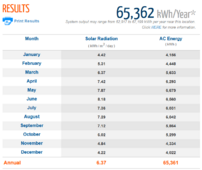My suggestion is to go with a system that can adapt to almost any future option; batteries , solar, grid import& export and generator capable. That it is professional AND end user friendly as well as code compliant. Multiple (4ea ?) Sol-Ark 15 (proven) or the Eg4 18kpv inverters comes to mind. Eg4 batteries for either inverter. It’s likely your neighbors have panels that have micro inverters that make electricity for them and send what they don’t consume back to the grid….IF the power company wants it! If their utility loses power, so do they even if the panels make enough power! Yes there may be a few that have battery/solar or generator. What you probably want is a system that collects the energy during the day, stores it for the evening when the heat of the day finally makes it’s way into your house and you can run your air conditioning, cooking and lighting. It doesn’t do any good to make solar power during the part of the day if you don’t have the demand, no way to store it and the utility won’t buy it or pay what it’s worth. A battery system also lets you take power from the grid at off peak times to supplement when solar conditions are poor.
If your electrician hasn’t done this type of solar + battery installation( most haven’t), he’s probably way out of his league.
Don’t be overly optimistic about how much solar you can put on your roof. The panels should face mostly south to be economical. Also there may be some code setbacks from ridge or edges, also pipe or vents(some can be relocated). Then there’s where the rows just won’t fit right. Realistically only 40% of a typical roof is worth covering with panels. That’s why some of the first questions were, “How much land do you have”. A good installer can give you an audit with a close up inspection and see any issues, not just a AI app. Another thing to look into is improving your attic insulation if it isn’t already high performance. Zone control of your home, being able to close off areas not being used hence not needing HVAC. The reality is, that you might be able to cut back to a third or a quarter of your electric bill. So now you get to crunch the numbers on what to do to get how much back and return on investment versus expected system life. Fun




